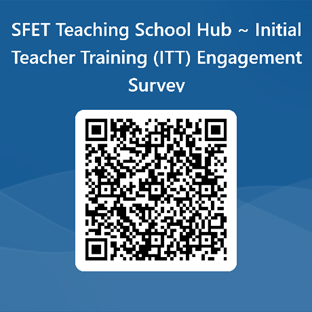TS Hubs and ITT
ITT Strategic Role
The Department for Education has asked Teaching School Hubs to gather information about engagement in ITT across their region as part of a new strategic role.
Our aim in doing this is to understand the ITT landscape, including any challenges, in our area and, where possible, to increase school engagement in ITT to ensure a steady supply of high-quality teachers for the children across the region.
Recruitment of new teachers is at the heart of this work. Together, we need to recruit 35,000 teachers each year. That means recruiting:
- 96 teachers a day
- 4 an hour
- 1 every 15 minutes
However, if every school in the country trained two teachers per year, we would have a surplus!
To help our mapping of the ITT landscape, please could you complete a brief survey outlining your engagement with ITT this academic year. You can click here or scan the QR code.
Delivery of ITT
As school-led centres of excellence for professional development, Teaching School Hubs already play a significant role in delivering ITT.
Additionally, Recommendation 10 of the ITT Market Review set out that:
“Teaching school hubs should partner with an accredited provider to play a role in the delivery of ITT (unless they are operating at accredited provider level). DfE should place a requirement on teaching school hubs to support local ITT delivery in specific strategic ways as required, for example through building school capacity for ITT by building an active mentor network in the local area, providing specific support for schools serving disadvantaged communities to enable them to engage with ITT, or modelling high quality intensive practice placements for other schools undertaking this aspect of ITT for the first time.” ITT Market Review report, July 2021.
The ITT delivery role detailed in recommendation 10, with TSHs acting as either an accredited provider or lead partner, will commence from September 2024.
This means that the DfE expects that all TSHs:
- will recruit trainees as agreed with the accredited ITT provider;
- will deliver courses on behalf of the accredited ITT provider;
- and will have those courses inspected by Ofsted as part of the accredited ITT provider’s inspection (with the inspection outcome resting with the accredited provider).
Detail about Strategic Roles in ITT
From September 2023, all TSHs are expected to deliver the new strategic roles to support local ITT delivery across their TSH area. This will be primarily focused on increasing school engagement in ITT with all ITT providers operating in the hub area - both in school placements and school settings for intensive training and practice. Two strategic roles have been identified, which support the ITT market ahead of the ITT reforms in September 2024:
1. Increase school engagement in ITT across their TSH region
Activities in AY 2023/24:
• Map school involvement in ITT within their local area, making use of local ITT networks and DfE data to identify schools who are fully engaged, have limited engagement or are not engaged in ITT to understand local issues.
• Using DfE data, engage with ITT providers in the local area to further build knowledge of the ITT landscape in your area.
• Complete targeted engagement by promoting the benefits of ITT, discussing the new ITT reforms and requirements and providing information of the ITT providers operating within their area. Engagement is focused on schools not involved in ITT and on developing high quality placement opportunities to grow capacity in other priority areas such as shortage subjects, disadvantaged areas and cold spots.
• TSH will support schools that want to be involved in ITT by providing examples of how this works in practice and what they may need to prepare.
2. Find and support Intensive Training and Practice (IT&P) across their TSH region
Although it is a provider’s responsibility to design and secure its own IT&P across its partnership, TSHs can play an important regional role in understanding the local market, raising awareness of the new IT&P requirements with schools and encouraging them to engage. TSHs are also well placed to support providers to identify suitable schools for IT&P if they do not currently have suitable provision secured.
Activities in AY 2023/24:
• Complete additional targeted engagement with schools to explain/encourage them to consider hosting IT&P placements including disseminating relevant findings from NIoT’s IT&P pilots evaluation.
• Work with providers operating in the TSH area to understand IT&P delivery models and areas of demand for school-based activity.
• Developing a database of schools willing to host IT&P to support providers in their delivery of ITT against the new reforms.
TSHs will play an important regional role in their TSH area working with schools and ITT providers to understand the local market, context and challenges. Utilising this local knowledge and intel, TSHs will be well-placed to work with schools to raise awareness of ITT, fight misinformation and encourage increased engagement with ITT, particularly in ITT ‘cold spots’ and areas of disadvantage.
